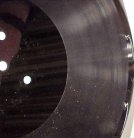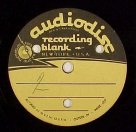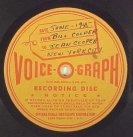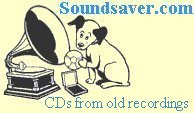Old Recordings Discs Tapes Wires Dictation Belts Other Media
| Sometimes called "acetates," lacquer coated records were the standard
medium for instantaneous recording in the broadcast and commercial
industry from their introduction in late 1934 until tape began to
cycle in about 1948. The lacquer surface is affixed to an aluminum
base, replaced during World War II with tempered glass. The 16" size
plays at 33 rpm , the smaller ones at either 78 or 33. Those for home
use have a thinner coating and were more subject to wear. When they
were well recorded and cared for, they can still sound terrific.



Unlabeled Record Adhesive Label Recording Booth Label They are often found with white or other discolored debris on the surface. Frequently, this is leached out material rather than dirt that should not be removed until immediately before copying. Damaged discs are common. They scratch easily, loosen and flake up from the metal or glass base (sometimes not recoverable) and are subject to a variety of other ageing and wear problems requiring more repair time. BASIC LISTENING. Cleaning and copying to the workstation; setting basic equalization and processing the sound through the digital cleanup program; initial playing speed adjustment, $ 100 per side. ADDITIONAL SERVICES: ENHANCED LISTENING. Removing many clicks and other non-program noises by hand editing that the digital program does not. Further hiss reduction, equalization and level adjustment, $ 25 to $ 75 per side. REPAIRS. Making a continuous program of a side interrupted by repeating or skipped grooves, $ 15 to $ 75 per side, more for those with extreme damage. This often involves tracking the groove by hand, one revolution at a time, and assembling the fragments. COPYING. Recording your CD or cassette copy from the restored signal including assembling the selections into playing sequence is $ 30 for the first CD or cassette, $ 20 for each thereafter. A CD can hold 14 or so five minute sides or 4 fifteen minute sides.
This site ©2001 Steven Smolian. rev 1 |
